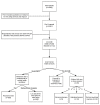Barriers to Mental Health Treatment in the Saudi National Mental Health Survey
- PMID: 32486182
- PMCID: PMC7311952
- DOI: 10.3390/ijerph17113877
Barriers to Mental Health Treatment in the Saudi National Mental Health Survey
Abstract
Objectives: To examine barriers to initiation and continuation of treatment among individuals with common mental disorders in the Saudi National Mental Health Survey (SNMHS). Methods: The SNMHS is a community-based epidemiological survey in a nationally representative household sample of respondents aged 15-65 in the Kingdom of Saudi Arabia. The World Health Organization Composite International Diagnostic Interview (CIDI) 3.0 was used. Predictors of barriers to treatment were analyzed with multivariable logistic regression. Results: Among participants with a 12-month DSM-IV/CIDI disorder (n = 711), 86.1% reported no service use. Of those (n = 597), 50.7% did not think they needed any help (categorized as "low perceived need") and 49.3% did perceive need. Of those who perceived need (n = 309), the majority (98.9%) reported attitudinal barriers to initiation. In contrast, 10.3% of those with a perceived need reported structural barriers. Respondents who were previously married or indicated below-average income were more likely to believe they needed help. Conclusions: Among people with a diagnosed mental disorder, low perceived need and attitudinal barriers are the primary barriers to mental health treatment in the KSA. The results suggest that addressing poor mental health literacy may be essential factor in reducing the unmet need for mental health treatment in the KSA.
Keywords: Saudi National Mental Health Survey (SNMHS); World Mental Health (WMH) survey initiative; barriers to treatment; dropout rates; mental disorders; mental services; unmet need for treatment.
Conflict of interest statement
The other authors declare no conflicts of interest.
References
-
- Institute for Health Metrics and Evaluation The Global Burden of Disease Study. [(accessed on 17 October 2019)]; Available online: http://ghdx.healthdata.org/gbd-2017.
-
- World Health Organization Global Spending on Health: A World in Transition. [(accessed on 13 February 2020)]; Available online: https://www.who.int/health_financing/documents/health-expenditure-report....
-
- Alonso J., Liu Z., Evans-Lacko S., Sadikova E., Sampson N.A., Chatterji S., Abdulmalik J., Aguilar-Gaxiola S., Al-Hamzawi A., Andrade L.H., et al. Treatment gap for anxiety disorders is global: Results of the World Mental Health Surveys in 21 countries. Depression Anxiety. 2018;35:195–208. doi: 10.1002/da.22711. - DOI - PMC - PubMed
Publication types
MeSH terms
Grants and funding
LinkOut - more resources
Full Text Sources
Medical


